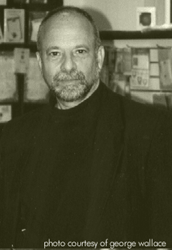 I
am delighted with the honorary co-chairmanship of this event by David
Amram and Carolyn Cassady, two wonderful and warm hearted contemporaries
of Jack Kerouac. And I am gratified with the enthusiastic response shown
by the people of San Francisco, New York, Lowell and Orlando - in particular
organizers Marsha Garland, Dariana Hayward, James Stauffer, Jack Foley,
Marty Cummins, Loren Ford and Lawrence Carradini - to the idea of celebrating
Jack Kerouac's great book, BIG SUR.
I
am delighted with the honorary co-chairmanship of this event by David
Amram and Carolyn Cassady, two wonderful and warm hearted contemporaries
of Jack Kerouac. And I am gratified with the enthusiastic response shown
by the people of San Francisco, New York, Lowell and Orlando - in particular
organizers Marsha Garland, Dariana Hayward, James Stauffer, Jack Foley,
Marty Cummins, Loren Ford and Lawrence Carradini - to the idea of celebrating
Jack Kerouac's great book, BIG SUR.
Jack
Kerouac is of course known around the world for his youthful book ON
THE ROAD, written in the fifties about being young and uninhibited and
unconventional and free. It's an American classic, and the movement
it spawned helped transform American culture and continues to do so.
Kerouac is increasingly recognized as a major figure in 20th century
American literature, and it is exciting to see communities across America
celebrate him as one of their own.
Less well known
are his other accomplishments as a literary innovator and as an author,
in particular with this insightful novel. BIG SUR. Written nearly a
decade after ON THE ROAD, it is notable for its mature concerns - mid-life
issues of mortality, the limits of personal attainment, and the place
of the individual in the cosmos. Kerouac treats these themes with power,
accomplishment, and an unusually honest and direct manner in this exceptional
book. I think I am not alone when I say that BIG SUR merits wider attention
- not only in that it concerns itself with far different issues than
those in ON THE ROAD - but for the writing. It is an unusually honest,
direct, and effective work, written with energy and pyrotechnics. His
descriptions of a mental breakdown and fearful interaction with the
natural environment are particularly evocative and compelling.
And the book's climactic
scene, in which Kerouac faces these issues head on in a penultimate
moment in the woods surrounding the Big Sur cabin he is visiting, and
finds a transcendant resolution to his crisis, is unforgettable. Kerouac
argues, in a moment of spiritual clarity, how any of us, no matter how
flawed - by accepting mortality and the impermanance of the individual
in the world - may face the human dilemma with courage and grace.
In this concluding
moment to the novel, Kerouac offers to readers a message of hope and
reconciliation which in his life and work he paid for dearly.
It is particularly
fitting that this book is being celebrated now, as the career and accomplishments
of Jack Kerouac continue to inspire not only the young people of America,
but also those of another generation, the Baby Boom generation who were
moved by his work early in their lives, and whose lives are approaching
denouement.
-George
Wallace